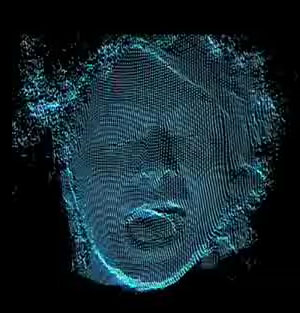User-Generated advertising, double standards and memes
 Radiohead has continued going where no band has gone before, and in another ground-breaking innovative marketing and licensing strategy they have released their latest video under a Creative Commons BY-NC--SA licence. House of Cards is part of the already seminal In Rainbows, and it was a video recorded with 3D rendering techniques, no camera was used. What's more interesting is that the data for the video has been made available to the public, so that they can make their own variation of the code and add it to a YouTube group showing user-generated versions. This has already resulted in more than 20 videos and an iPhone applet.
Radiohead has continued going where no band has gone before, and in another ground-breaking innovative marketing and licensing strategy they have released their latest video under a Creative Commons BY-NC--SA licence. House of Cards is part of the already seminal In Rainbows, and it was a video recorded with 3D rendering techniques, no camera was used. What's more interesting is that the data for the video has been made available to the public, so that they can make their own variation of the code and add it to a YouTube group showing user-generated versions. This has already resulted in more than 20 videos and an iPhone applet.
In the cynical age we live in, it would be easy to be sceptical of Radiohead's efforts. After all, Radiohead is an established band with an almost cult-like status and a loyal following that ensures success in almost anything they do. It helps that they are practically the definition of geek cool (they were in the cover of Wired). I will leave my cynicism aside and declare that whatever they're doing, it's working. Radiohead have tapped into the user-generated phenomenon and recognised that the old paradigm is dead, long live the new paradigm. In the age of YouTube, it pays to advertise through YouTube. Paying for commercials in Channel 4 is no longer productive.
I have been thinking a lot about the new media environment as I was watching yesterday the trailers for the upcoming E3. No prizes for guessing which online video delivery intermediary was used to stream the trailers. So, while posting and distributing these trailers is copyright infringement, you will never see a single video developer complaining about all the free publicity they're getting, the buzz they are generating, and the list of comments that follow each YouTube posting. PanGloss often makes the point in her Web 2.0 liability presentations that content owners are extremely keen on viral advertising and copyright infringement when it serves their needs, or when somebody posts something about an obscure show that needs the attention. After all, the one thing worse than being talked about is not being talked about, as Oscar Wilde said.
This is what angers me about the Viacom litigation more than anything else. Content owners are simultaneously using viral advertising, and also suing the intermediaries. User-generated marketing has become the norm in many areas such as gaming, music and TV. Why pay for an expensive advertising campaign when you can let the fans do it for you? Target the outlets smartly, and watch them flock to your content. Every week I get at least one request from video game developers to upload trailers in exchange for cash, not to mention offers by gambling websites to include links to their sites which will be paid. Apparently, this blog has been identified as a potential outlet where gamers hang out (whatever gave them that idea?)
I believe that both the traditional model and the online meme model will survive, I cannot see the old guard giving up that easily their stranglehold on income revenue streams. Nevertheless, traditional outlets will continue to look like dinosaurs, while innovators like Radiohead will continue to rake in the cash and the almost-universal praise.

 del.icio.us
del.icio.us




No comments:
Post a Comment